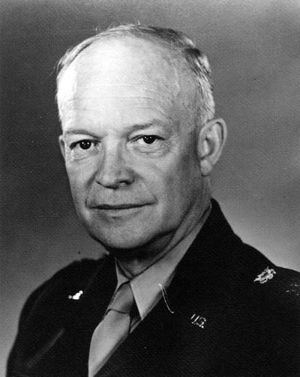Dwight D. Eisenhower: Difference between revisions
imported>Hayford Peirce m (Dwight Eisenhower moved to Dwight D. Eisenhower: He was pretty well known as having a middle initial, ie, DDE in newspaper headlines) |
imported>Hayford Peirce (rewrote first paragraph and most of the second paragraph) |
||
| Line 1: | Line 1: | ||
[[Image:Geneisenhower.jpg|right|thumb|Dwight Eisenhower]] | [[Image:Geneisenhower.jpg|right|thumb|Dwight Eisenhower]] | ||
General of the Army '''Dwight David Eisenhower''' (1890-1969) was an [[United States|American]] soldier who fought in [[World War I]], was a top commander in [[World War II]], and served as the 34th [[U.S. Presidents|president of the United States]] (1953-1961). During the war | General of the Army '''Dwight David Eisenhower''' (1890-1969) was an [[United States|American]] soldier who fought in [[World War I]], was a top commander in [[World War II]], and served as the 34th [[U.S. Presidents|president of the United States]] (1953-1961). During the war he first commanded Ally troops in [[North Africa]] in 1942, then became the Supreme Commander of the forces that invaded Normandy on [[D-Day]], June 6, 1944. | ||
Eisenhower was | Eisenhower's political affiliations were unknown for many years and he was courted by both the Democratic and Republican parties. Eventually he declared for the Republicans and was elected to the presidency as a moderate Republican. His presidency was marked by the armistice in the [[Korean War]], the construction of [[Interstate Highway System]], the [[Eisenhower Doctrine]] of the [[Cold War]], and moderate domestic policies known as "dynamic [[American conservatism|conservatism]]". Although a renowned military figure, at the end of his presidency, Eisenhower issued a famous warning to the American public about the dangers of the [[military-industrial complex]]. | ||
==See also== | ==See also== | ||
Revision as of 15:07, 10 September 2007
General of the Army Dwight David Eisenhower (1890-1969) was an American soldier who fought in World War I, was a top commander in World War II, and served as the 34th president of the United States (1953-1961). During the war he first commanded Ally troops in North Africa in 1942, then became the Supreme Commander of the forces that invaded Normandy on D-Day, June 6, 1944.
Eisenhower's political affiliations were unknown for many years and he was courted by both the Democratic and Republican parties. Eventually he declared for the Republicans and was elected to the presidency as a moderate Republican. His presidency was marked by the armistice in the Korean War, the construction of Interstate Highway System, the Eisenhower Doctrine of the Cold War, and moderate domestic policies known as "dynamic conservatism". Although a renowned military figure, at the end of his presidency, Eisenhower issued a famous warning to the American public about the dangers of the military-industrial complex.
